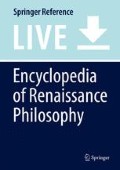Abstract
Philosophical skepticism takes two distinct forms in the ancient Greek and Roman tradition, but only one of those forms has an afterlife in the Renaissance. Renaissance skepticism refers primarily to the revitalization of dogmatic skeptical argumentation in the service of religious truth, on the one hand, and the disavowal of a less assertive form of classical skepticism, on the other. Ancient philosophical skepticism inspired Renaissance thinkers who had already accepted religious truth on the basis of a fundamental faith in divine revelation, including Jewish rabbis preaching in Italy and Christian authors battling scholastic Aristotelianism in France. Ancient skeptical argumentation became grist for the religious mill of proclaiming the superiority of religious truth over the doctrines of philosophy.
References
Primary Literature
Agrippa, Heinrich Cornelius. 1530. De Incertitudine et vanitate scientiarum et atrium, atque excellentia Verbi Dei, declamatio invective. Antwerp: Johannes Grapheus.
Charron, Pierre. 1986. De la Sagesse. Fayard: Texte établie par Barbara de Negroni. Paris.
de Valencia, Pedro. 1596. Academica sive de iudico erga verum, ex ipsis primis fontibus. Antwerp: Plantin.
Luzzatto, Simone. 1651. Socrate overo dell’humano sapere esercizio seriogiocoso di Simone Luzzatto Hebreo Venetiano opera nella quale si dimostra quanto sia imbecile l’humano intendimento, mentre non è diretto dalla divina rivelatione. Venice: Tomasini.
Montaigne, Michel de. 1999. Essais. 3 vols., ed. Villey-Saulnier. Paris: Quadrige.
Moscato, Judah. 1589. Nefuṣot Yehudah. Venice: Zu’an Digarah.
Moscato, Judah. 2010a. Judah Moscato sermons: Edition and Translation, vol. 1., trans. and eds. G. Miletto, G. Veltri, G. Corazzol, R. Grundmann, D. Harran, Y. Meroz. B. Ogren and A. Shear. Leiden: Brill.
Moscato, Judah. 2010b. Judah Moscato sermons: Edition and Translation, vol. 2., trans. and eds. G. Miletto, G. Veltri, G. Corazzol, R. Grundmann, D. Harran, Y. Meroz. B. Ogren, and A. Shear. Leiden: Brill.
Pico Della Mirandola, Gian Francesco, Joannis Francisci Pici Mirandulae Domini et Concordiae Comitis. 1520. Examen Vanitatis Doctrinae Gentium, et Veritatis Christianae Disciplinae, Distinctum in Libros sex, quorum Tres omnen Philosophorum Sectam Universim, Reliqui Aristoteleam et Aristoteleis Armis Particulatim Impugnant Ubicunque Autem Christiana et Asseritur et Celebratur Disciplina. Mirandulae: Impressit I. Maciochus Bundenius.
Sanches, Francisco. 1581. Quod nihil Scitur. Lyons: Antonius Gryphius.
Sanches, Francisco. 1988. That nothing is known. Introduction, notes, and bibliography by Elaine Limbrick. Latin text established, annotated, and translated by Douglas F.S. Thomson. Cambridge: Cambridge University Press.
Secondary Literature
Caluouri, Damian. 2007. The Scepticism of Francisco Sanchez. Archiv für Geschichte der Philosophie 89 (1): 30–46.
Cao, G.M. 2007. Scepticism and orthodoxy: Gianfrancesco Pico as a reader of Sextus Empiricus. Pisa: Fabrizio Serra Editore.
Floridi, Luciano. 2002. Sextus Empiricus. The transmission and recovery of Pyrrhonism. Oxford: Oxford University Press.
Frede, Michael. 1984. The Sceptic’s two kinds of assent and the question of the possibility of knowledge. In Philosophy in history: Essays on the historiography of philosophy, ed. Rorty Richard, J.B. Schneewind, and Quentin Skinner, 255–278. Cambridge: Cambridge University Press.
Popkin, Richard. 2003. The history of Scepticism from Savonarola to Spinoza. Oxford: Oxford University Press.
Schmitt, C.B. 1969. Gianfrancesco Pico della Mirandola (1469–1533) and his critique of Aristotle. The Hague: Martinus Nijhoff.
Schmitt, C.B. 1972. Cicero Scepticus. A study of the influence of the Academica in the renaissance. The Hague: Nijhoff.
Veltri, Giuseppe. 2011. Principles of Jewish skeptical thought: The case of Yehudah Moscato and Simone Luzzatto. In Judah Moscato, a “sagacious man”, 15–36. Boston-Leiden: Brill.
Author information
Authors and Affiliations
Corresponding author
Editor information
Editors and Affiliations
Section Editor information
Rights and permissions
Copyright information
© 2018 Springer International Publishing AG, part of Springer Nature
About this entry
Cite this entry
Snyder, C.E. (2018). Skepticism, Renaissance. In: Sgarbi, M. (eds) Encyclopedia of Renaissance Philosophy. Springer, Cham. https://doi.org/10.1007/978-3-319-02848-4_1129-1
Download citation
DOI: https://doi.org/10.1007/978-3-319-02848-4_1129-1
Received:
Accepted:
Published:
Publisher Name: Springer, Cham
Print ISBN: 978-3-319-02848-4
Online ISBN: 978-3-319-02848-4
eBook Packages: Springer Reference Religion and PhilosophyReference Module Humanities and Social SciencesReference Module Humanities
Publish with us
Chapter history
-
Latest
Skepticism in the Renaissance: Short Overview- Published:
- 12 March 2019
DOI: https://doi.org/10.1007/978-3-319-02848-4_1129-2
-
Original
Skepticism, Renaissance- Published:
- 23 June 2018
DOI: https://doi.org/10.1007/978-3-319-02848-4_1129-1

